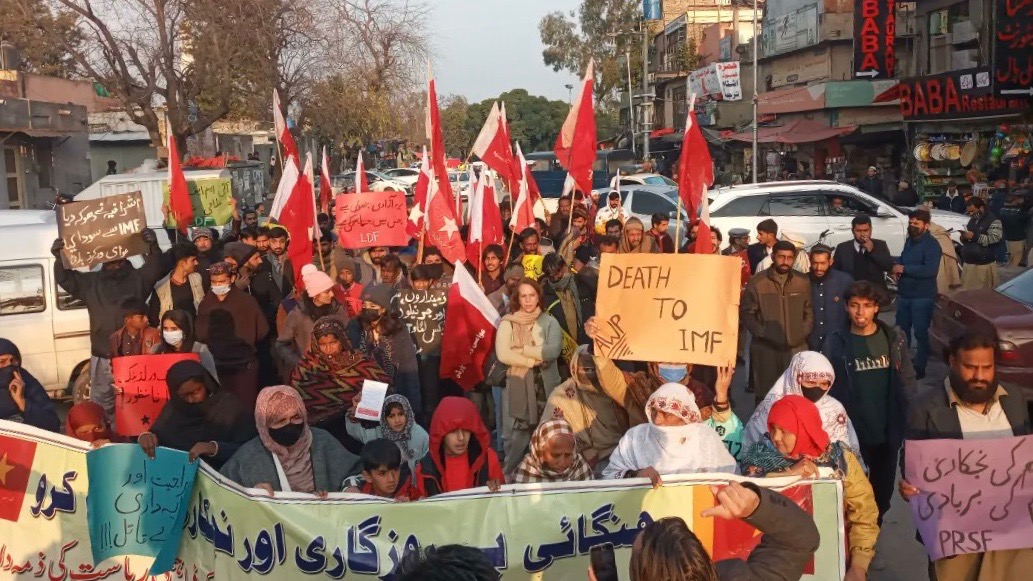Pakistan’s rising food inflation has sparked off protests across the country’s provinces. On Friday, January 13, political activists, academics, students, trade unionists, and other working class residents protested in Sindh’s Rawalpindi and in the national capital Islamabad over rising food prices, unemployment, and the economic hardships facing Pakistan’s poor.
The protest—organized by the Awami Workers’ Party (AWP), alongside other member organizations of the progressive Left Democratic Front (LDF)—featured numerous banners and placards condemning the state’s anti-people policies. Protestors marched carrying red flags and raised slogans against the IMF and the ruling regime in the country.
Protests against inflation, price hike and flour crises by Awami Workers Party in #Ghotki, #Sakrand, #TandoAllahyar
n #Hyderabad. pic.twitter.com/gi3hpGLshj— AWP Sindh (@AWPSindh) January 6, 2023
If the government is truly committed to the welfare of working masses it should levy taxes on real estate,announcing land reform,reducing non-productive expenditures,as well as initiating employment-generation industrialization, particularly in rural areas.#MarchAgainstInflation pic.twitter.com/sPyj7zWdfu
— AWP Islamabad Rawalpindi (@AWPIsbRwp) January 13, 2023
Student organization Progressive Students Federation (PRSF) tweeted in support of the protests: “If the government is truly committed to the welfare of working masses it should levy taxes on real estate, announcing land reform, reducing non-productive expenditures, as well as initiating employment-generation industrialization, particularly in rural areas.”
Glimpses of @AWPIsbRwp Protest Against Inflation and Unemployment today at Aabpara Chowk. Scores of students, youth, women and workers joined us to raise their voice against the capitalist system and highlighted the need to unite and organize for revolutionary change! pic.twitter.com/4fhy6XQbCu
— PRSF Islamabad Rawalpindi (@ProgStudentsFed) January 13, 2023
In Khyber Pakhtunkhwa (KP) region, the Mazdoor Kissan Party (MKP) organized a massive rally in protest against the uncontrolled rise of the prices of essential commodities, flour shortages, and rising incidents of extremist violence in and around the northern province.
MKP protest against price hike. Must listen to the voice of workers. pic.twitter.com/aEeGnfx5Ye
— Dr. Taimur Rahman (@Taimur_Laal) January 15, 2023
MKP Central Chairman Salar Fayaz Ali, warned the government and district administration that if the availability of flour and other foodstuff was not ensured within a day, indefinite protests would be started that would not stop until the demands of those suffering were met.
A massive rally from the hujra of Central Chairman MKP Salar Fayaz Ali emerged and recorded a protest in Tehsil Tangi District Charsadday, KP against the current situation i.e., uncontrollable prices of commodities, flour, and insurgency in the country.https://t.co/bEQ51tRFsc pic.twitter.com/u08INBlNrZ
— Mazdoor Kissan Party (@PMKPOfficial) January 13, 2023
More protests have been organized since Friday by other political parties in different cities against price inflation and shortages of wheat flour. In KP’s Bannua area, Pakistan Tehreek-i-Insaf (PTI) workers took out a rally carrying banners and placards inscribed with slogans against inflation.
In Balochistan, Food Minister Zamarak Khan Piralizai sent an SOS on January 9 to the federal and provincial governments in Punjab and Sindh. He announced that the food department had run out of its wheat stock and called for help from other provinces and the center. “We are facing a very serious crisis and need 600,000 bags of wheat on an emergency basis,” he said, as reported by Dawn.
Several districts in Pakistan have been reportedly experiencing flour shortage recently. The prices of wheat and flour have hit unprecedented highs amid the ongoing crisis. Flour mill owners in Lahore have blamed the crisis on a reduction in wheat released by the government, and have said that this has increased prices. The prices of other commodities such as cooking oil, meat, eggs, and fodder for farm animals have also been considerably hiked.
On January 2, the Pakistan Democratic Movement (PDM)-led government increased the prices of cooking essentials such as wheat flour, sugar, and ghee (clarified butter) at subsidized government sellers by 25 to 62%, ostensibly to “to reduce the impact of untargeted subsidies.” Under the new rates, the price of sugar has been raised from PKR 70 per kg to PKR 89, an increase of 27%. Likewise, the price of ghee has been raised by PKR 75 per kg to PKR 375, and the price of wheat flour has been increased by 62% to PKR 64.8 per kg from PKR 40. In December 2022, the price of wheat flour at unsubsidized markets in Pakistan was PKR 133, as per global price aggregator GlobalProductPrices, and has reportedly only increased this month.
مہنگائی https://t.co/KoBXIAlCmM
— Dr. Taimur Rahman (@Taimur_Laal) January 8, 2023
Earlier this month, on January 8, a 40-year-old worker, Harsingh Kolhi, died during a stampede at a sale of subsidized flour in Sindh’s Mirpurkhas. Kolhi’s family staged a sit-in outside the city’s press club for five hours demanding action in response to his death.
Since catastrophic floods submerged one-third of Pakistan in 2022, food inflation has been on the rise. In rural areas, rates of food inflation passed 30% in August and continued to rise, reaching 37.9% in December 2022. In urban areas, food inflation rose past 30% in September, touching an all-time-high of 34.7% in October before slipping back to 29.7% in November. But, in December, urban food inflation once again rose to 32.7%.
Pakistan’s explosive food inflation situation has been linked to several factors, primarily domestic food shortages in the post-flood period, higher food prices in the international market, and hoarding, which encourages the emergence of black markets due the failure of authorities to enforce subsidized prices.





